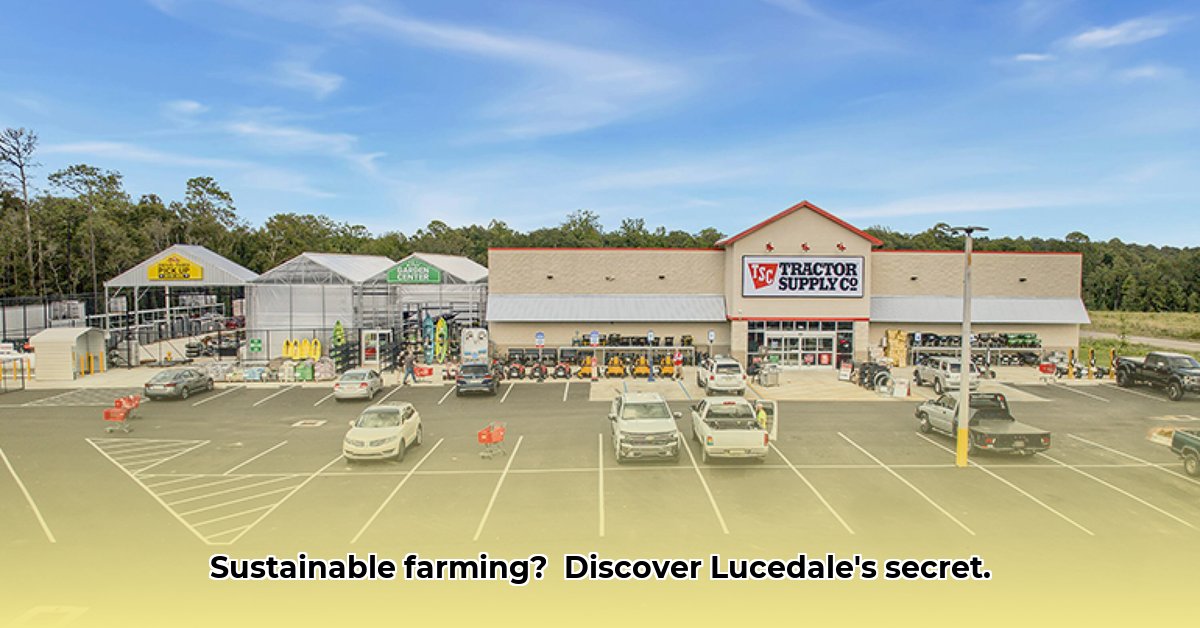
Lucedale Tractor Supply (LTS) serves as a vital link in the agricultural supply chain of Lucedale, Mississippi, providing essential goods and services to local farmers and gardeners. This article analyzes LTS's contribution to sustainable agriculture, examining both its strengths and areas for improvement, using the Lucedale store as a case study. We will explore the store's product range, accessibility, and community impact, while also addressing challenges related to transparency and data availability. Finally, we propose actionable recommendations for enhancing LTS's sustainability initiatives. For another example of a Tractor Supply Company's contribution, see this Hohenwald store page.
LTS's Product Offering and Accessibility
LTS offers a broad range of products crucial for sustainable agriculture, including seeds, fertilizers, tools, and livestock feed. This comprehensive selection caters to diverse needs, from small-scale home gardeners to larger farming operations. The store's convenient location within Lucedale ensures easy access to essential supplies. This accessibility is paramount, minimizing logistical barriers to the adoption of more sustainable farming methods. Furthermore, the knowledgeable staff provides personalized service and expert advice, guiding customers toward environmentally sound practices. This hands-on support plays a critical role in promoting sustainable agriculture within the community.
LTS and Sustainable Agriculture: A Symbiotic Relationship
LTS's impact extends beyond the provision of goods. By serving as a local supplier, it keeps revenue within the community, supporting the local economy and strengthening its resilience. The store fosters community engagement, creating a network of local farmers and gardeners who can share knowledge and best practices regarding sustainable agriculture. This collaborative environment facilitates the adoption of eco-friendly farming techniques. However, does this indirect support suffice? What are the opportunities for direct involvement in promoting sustainable agriculture?
Challenges and Opportunities: Areas for Improvement
While LTS demonstrably supports sustainable agriculture, significant opportunities for improvement exist. A major challenge is the lack of transparency regarding the sourcing and environmental impact of its products. Detailed information on supply chains, including environmental certifications and sustainable production practices from suppliers, is absent. Similarly, the absence of quantitative data on LTS's environmental footprint (e.g., greenhouse gas emissions, waste generation) hinders a comprehensive assessment of its overall sustainability contribution. This lack of data presents a significant obstacle to achieving true sustainability and building consumer trust. How can LTS address these challenges and improve its data collection and transparency?
Recommendations and Future Outlook
Several key actions can significantly enhance LTS's contribution to sustainable agriculture. First, LTS should prioritize transparency by proactively disclosing information about product sourcing and environmental impacts throughout its supply chain. This includes detailed information on the sustainability profiles of its suppliers. Second, the establishment of clear, measurable sustainability goals, coupled with regular reporting on progress, is essential. These goals could include targets for carbon neutrality, waste reduction, and sustainable sourcing. Third, LTS could enhance its already strong emphasis on staff training by providing additional education on sustainable agriculture practices, empowering them to effectively advise local farmers and gardeners. This will directly improve the level of sustainable agriculture within the community. Finally, collaboration with local farmers, consumers, and government agencies is crucial for achieving long-term sustainability goals.
Actionable Intelligence: A Collaborative Approach
The following table outlines actionable short-term and long-term steps for all stakeholders involved:
| Stakeholder | Short-Term Actions (0-1 Year) | Long-Term Actions (3-5 Years) |
|---|---|---|
| Lucedale Tractor Supply | Implement a supply chain transparency initiative; increase staff training on sustainable practices. | Establish comprehensive sustainability reporting with publicly accessible metrics; set and monitor ambitious sustainability targets (e.g., carbon neutrality). |
| Local Farmers/Gardeners | Participate in LTS-offered training programs on sustainable practices. | Develop a cooperative to share best practices & advocate for policies supporting sustainable agriculture. |
| Consumers | Actively seek out and purchase sustainably sourced products from LTS. | Advocate for stronger regulations on product labeling and provenance. |
| Government Agencies | Offer grants and incentives to support sustainable agriculture research and adoption. | Develop and implement incentive programs rewarding businesses and farmers for sustainable practices. |
Conclusion
Lucedale Tractor Supply plays a crucial role in supporting the agricultural community. By enhancing transparency, implementing measurable sustainability goals, and collaborating with all stakeholders, LTS can significantly contribute to a more sustainable agricultural future. The journey requires commitment and proactive engagement, but the potential benefits for the environment, economy, and the community are substantial.